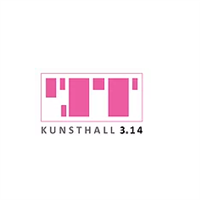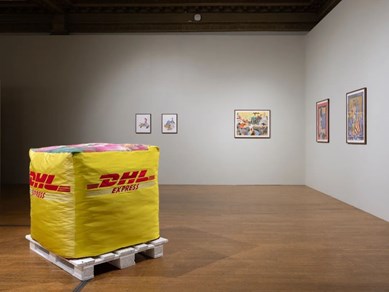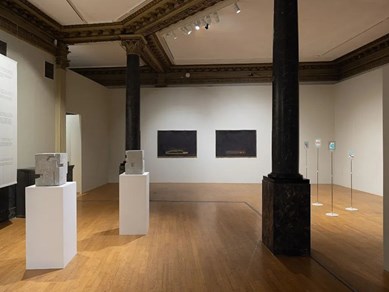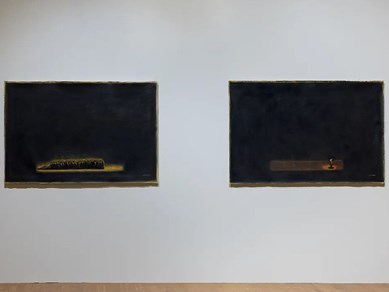16 Feb - 19 May, 2024
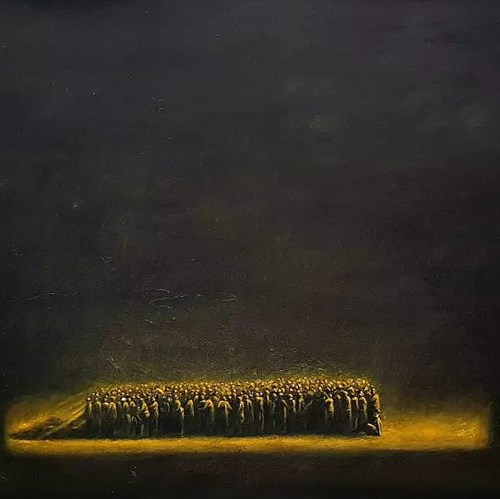
Statement:
The exhibition Can the Afghan speak? focuses on the not in-the-power-Afghans who are not recognized as subjects in local, nor global contexts. If oppressed by one side and ignored by the other like a failed project that no one wants to be reminded of, how can they claim their subjectivity and agency?///
The selected artworks by seven Afghan artists: Ali Rahimi, Farila Neshat, Hangama Amiri, Mohsin Taasha, Sher Ali Hosseini and Elyas & Abdollah Jafari Alavi shed light on the hegemonic forces of both local and international settings that create hierarchies and inferior positions – “the Afghans” that cannot speak.
The vast diversity of Afghanistan is often forgotten in Western narratives that fail to understand the inherently different construction of society, stories where Afghans are seen as objects to be rescued and civilized. Afghans have been disempowered by both modern world mechanisms of power executions and local militarized patriarchy. The decades of armed conflict and the local patriarchal structures have created extremely narrow and hard-to-break social norms and physical restrictions that narrow down self-expression and the freedom of speech.
The country has been in a continuous war, armed conflict and uproar for the past four decades. The Soviet–Afghan war from 1979 to 1989, the civil wars in the 1990s, the US-invasion and war against Taliban after September 11, and finally, Taliban’s return to power after the withdrawal led by United States troops in 2020–2021, have left Afghanistan alone in a state of chaos. Militarized patriarchal values are also present in local traditional cultures and religions, such as Pashtun honor codes, the Taliban jihadi ideology and Sharia law.
Afghanistan – located in the crossroads of Central, South and Southwest Asia – is a mosaic of various ethnicities, cultures and geographies. With more than 40 distinct languages and stark contrasts between urban and rural areas, Afghanistan is a land of enormous complexity and diversity. The country is home for various different nomadic communities and ethnic groups, such as Pashtuns, Tajiks, Hazaras and the Uzbeks.
The exhibition pursues to provide a platform for “the Afghans” as subjects possessing political agency. The actively engaging subjects take part in a dialogue that must be mutual. Can the Afghans be heard? How to listen without falling into stereotypes or blatant simplifications? The exhibition aims to enable forms of communication that might stretch and challenge the boundaries of the dialogue itself, escaping beyond the textual, rational and Western mode of communication.
Breaking stuck patterns and defying dogmatic thinking, art can create a middle ground, operating beyond antagonistic positions. Earnest listening might resemble a careful translation that recognizes both the multiplicity and subtleness of the original work and the limits of the listener’s own role.
The Hazara painter Ali Rahimi (b. 1995, Daikundi, Afghanistan) was displaced from his homeland and immediate family at a young age. In the two paintings titled A Quiet Place, an unknown void-like blackness surrounds, agitates and wretches the subjects, pointing towards existential questions and complications of immigrant life. Rahimi is based in Tehran, Iran.
Farila Neshat’s (b. 1994, Kabul) three Soul House sculptures are created from concrete and engraved with her family’s stories. The rectangular but asymmetrical cubes are poetic references to both personal and shared histories, like objects of individual and collective memory. In her practice, Neshat works to protect cultures and histories from collective oblivion. She is based in Vienna.
Hangama Amiri (b. 1989, Peshawar, Pakistan) works predominantly with textile and figurative imagery, exploring the power of representation. Her soft sculpture at Kunsthall 3,14, DHL Large Box with Objects of Belonging, refers to Amiri’s teenhood in Dushanbe, Tajikistan. Living in different countries, her migratory family kept contact through DHL parcels containing exchanged goods, objects, photos, memories and shared stories. Amiri is currently based in New Haven, USA.
In Mohsin Taasha’s (b. 1991, Kabul) gouache paintings The Red Passport Series, the iconic images of the US air force plane merge with imagination and the color red, a frequent element in Taasha’s oeuvre. Painted on the pages of passports, the images provoke questions of identity. Belonging to the ethnic group of Hazaras which has been discriminated and massacred by the state, but holding an Afghan passport, Taasha has described his identity as double. He is based in Nice, France.
Sher Ali Hosseini (b. 1983, Kabul) combines the traditional technique of Persian miniatures, small paintings on paper, with contemporary perspectives. The six paintings (Genesis of Fear, Lasso dynasty 1–3, Embrace of Fear 1–2) are created with gouache, gold leaves and ink on arches and handmade wasli paper. The poignant reflections that narrate historical and present-day concerns in Afghanistan are characterized by genocide, terror, oppression, and an unwavering resilience to forget. Today, Hosseini is based in Melbourne, Australia.
The brothers Abdollah Jafari Alavi (b. 1992) and Elyas Alavi (b. 1982) work with poetry and visual arts with a variety of media. Through intimate narration and using personal archives as their material, their video work hovers around the day that Taliban conquered Kabul in 2021. The title of the work comes from President Joe Biden’s careless response to a question about the situation in Afghanistan some months before Taliban’s return to power: I want to talk about happy things, man!
The exhibition is curated by the Iranian freelance curator Alireza Bayat (b. 1987) for Kunsthall 3,14. His work centers around intersectionality and socio-political activism. Bayat is currently working as a senior research assistant at the University of Winnipeg in Canada.
Curator:
Artists



